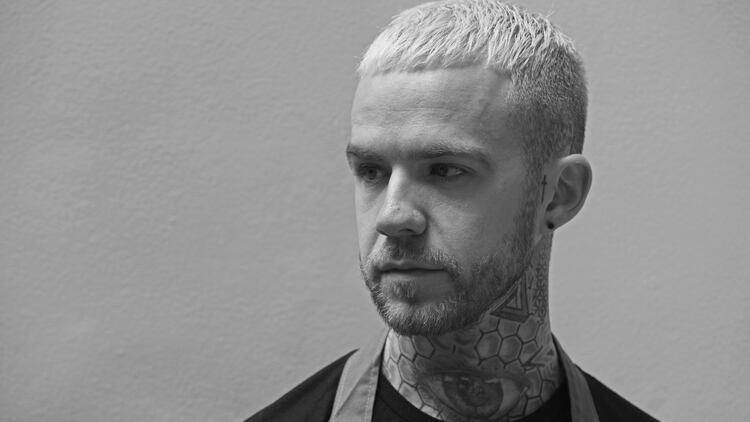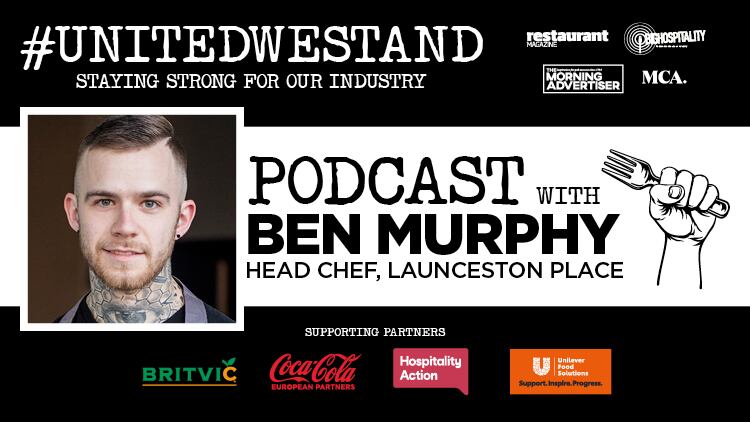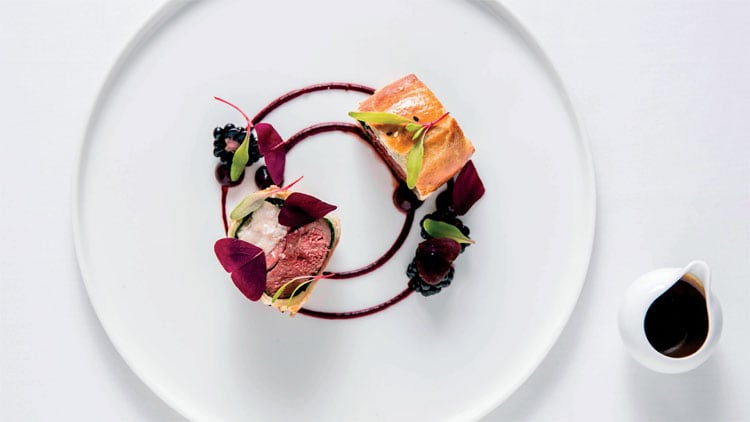There’s a moment in the most recent series of Great British Menu (GBM) where chef Ben Murphy reveals he isn’t able to try his lobster dish due to the fact that he is allergic to the crustacean. You can cut the tension between judges and presenters Andi Oliver and Paul Ainsworth with a paring knife.
To make matters even more tense Murphy’s dish, named ‘You’ll be eating it all’ in honour of Peter Durand, the man credited with receiving the first patent for preserving food in tin cans, is made with cold lobster and features a white chocolate and lobster bisque ‘lid’. It’s a flavour combination one would assume would be worth having first-hand knowledge of before presenting it on a TV show in front of millions of people.
This is an obvious discussion point when Murphy, freshly promoted to chef-patron at Launceston Place (he’s been cooking at the Kensington restaurant for the past four and a half years) sits down to talk. Followers of GBM know what happened next; the dish didn’t go down particularly well with the judges or his fellow chef contestants who got the chance to try it as well, with one commenting that without the lobster it “was a dessert”.
“It was a risk,” he admits when I bring it up. “You have to take risks in life. That was one that didn’t pay off.”
So, would he do things differently next time round? “Yes and no. It was a tested recipe and I know that dish is good because it was something similar to what I learnt when I was working at a three-star restaurant in Paris. Pierre Koffmann tasted it and said it was a good dish. If I get the chance to go back again, I’m not going to take that big a risk, but I’ll take a risk within reason.”
Pay off it certainly didn’t this time round. However, it is this attitude that has seen Murphy carve out a reputation as an exciting young cooking talent and catch the eye of Pierre Koffmann, who has been something of a father figure since his early days in the professional kitchen.
A more mature Launceston Place
Murphy took over the kitchen of the D&D London-owned Launceston Place in early 2017, and his bosses David Loewi and Des Gunewardena this month showed their commitment to him by promoting him to chef-patron. The new position has also marked a coming of age for the restaurant, with Murphy dropping some of the quirkier aspects of the restaurant service, including the serving of chips in a mini supermarket trolley (a nod to his mum who worked at Waitrose), placing emojis on the menu (an idiosyncrasy he freely admits he copied from Gaggan restaurant in Bangkok), and the use of mini-Henry vacuum desk cleaners to decrumb tables.
The quirks were a success, the emoji menu in particular bringing in the Chinese crowd and the vacuum cleaners and trolleys becoming Instagram hits that diners still enquire about. But while Murphy enjoyed the less formal feel they provided he eventually felt they were out of place.
“Lockdown made me realise a lot, that maybe all of the gimmicks could have been a distraction for the food. We have three rosettes here and I want four, so I am dialling that back. I also turned 30 last year. There was a time and place for it, and it did its time.”
That said, he hasn’t completely moved away from bringing something a bit different to the table. New for this year is the Phyllis menu, named after his grandmother, which is presented on a checkerboard in honour of the favourite game he would play as a child with her.
The ‘rules of play’ are that a diner removes all the pieces to reveal the dishes and course options and then replaces them to reveal only those they want to eat. The quirk, beyond the fact that the pieces sound as if a game of checkers is actually being played, is that diners can choose three mains or indeed three desserts, with Murphy and his kitchen team happy to send desserts away with the starters if diners so wish (given the option his mother would choose three puddings, he says).
“This menu is going to help drive revenue. It’s more personal as it’s linked to me and it gives people more options. We don’t need to be changing our lunch menu every week, you can keep choosing whatever you want. It’s still fun and it’s going to be a talking point but after that it’s all about the food. It’s taken me 10 years in the industry to get to where I want to be.”
A French experience
It’s been an eventful past decade for Murphy who earned his stripes in the traditional way by working in some of France’s top kitchens. He has Koffmann to thank for this, with the famous French chef having been a constant in Murphy’s career ever since he joined his restaurant Koffmann’s at the Berkeley as a fresh-faced graduate from Westminster College Kingsway.
Koffmann, a man who needs no introduction within these pages, was unknown to the then 19 year-old Murphy (“Gordon was the icon of the industry at the time”), who simply saw an advertisement for the job pinned on the college notice board and went for it.
“I struggled but it was make or break, and I learnt,” he says of his first experience working in a professional kitchen. “I got the adrenalin of a busy service. Going in in the morning knowing that you’re going to be in the shit was actually quite fun. I loved watching people get bollocked by Koffmann because it wasn’t me.”
This sounds an all-too familiar situation for a young chef, but Koffmann’s uncompromising approach in his kitchen proved formative. Murphy admits to having been on the end of his fair share of bollockings but they instilled a work ethic - and indeed an attitude - that has put him in good stead throughout his career. “Koffmann was fair. He likes to come across as this big grizzly bear, but he is such a nice guy, very humble and down to earth. And he is very family orientated - that was what made us become a family.
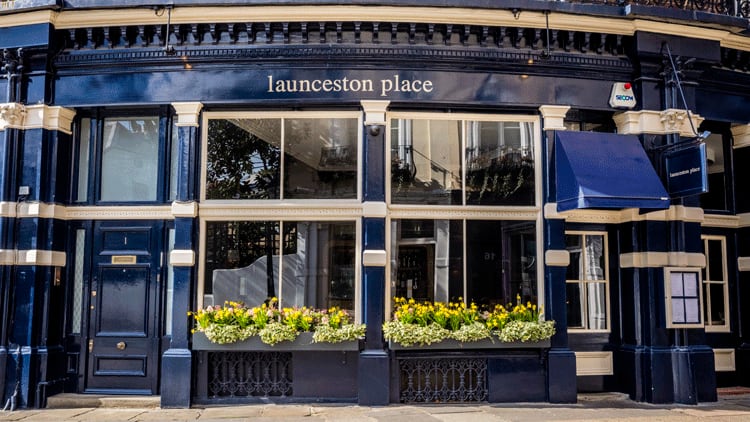
“Him and [his wife] Claire are like my mum and dad of the industry. My actual parents are not foodies at all - my mum came here for Father’s Day and had tomato salad and beef well done, that’s her vibe. Pierre and Claire visited the restaurant once or twice a week before the pandemic hit and are always the ones I will speak to and get guidance from.”
While it’s not unheard of for a chef to take a protégé under his wing, the lasting relationship between Koffmann, under whom numerous young chefs have worked, and Murphy is singular. What is it, he thinks, that Koffmann particularly saw in him? Murphy isn’t completely sure.
“I guess I got a bit lucky,” he muses after a bit of consideration. “When I joined the Berkeley, I went straight to pastry for a year because the other side was so busy. I wanted to learn, I never called in sick and was always on time. I also wanted to bring things to the table, and he respected that. That’s where the relationship became true.”
“I went from London to a village of 100 people aged just 22. I couldn’t speak French - I only knew the swear words in French from when Koffmann was angry at the Berkeley”
It is Koffmann who Murphy has to thank for the understanding of classic French cooking that now underpins his own cooking style. When he decided it was time to leave Koffmann’s the chef offered to use his contacts to get him a job in some of the world’s best kitchens, including Quay in Australia and The French Laundry and Per Se in the US. Instead, Murphy opted for something closer to home, choosing Michel Guérard’s three Michelin-starred Les Prés d’Eugénie in the south of France, with Koffmann himself driving him there. “His family was living in Gascony at the time and we drove for a day to get there. We stayed with his family and he introduced me to the restaurant.”
Like many young chefs who make the pilgrimage to France’s famous kitchens, Murphy’s experience was a mixed bag. Known for their rigorous approach to extremely high standards and tacit territorial wars between chefs vying to catch the eye of the boss, France’s top Michelin kitchens often don’t take prisoners, and Murphy was no exception. There were the highs: he recalls with affection going out at 5am with the brigade each day to pick the vegetables for the lunch menu; but also the lows, most memorably the loneliness of being a young outsider with no grasp of the language.
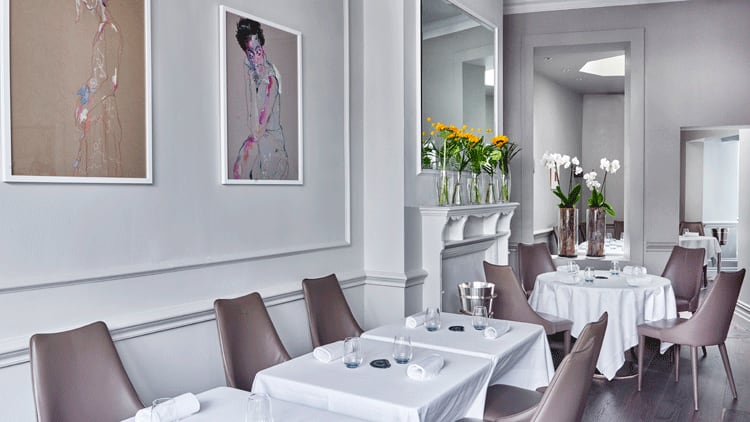
“I went from London to a village of 100 people aged just 22. I couldn’t speak French - I only knew the swear words in French from when Koffmann was angry at the Berkeley, but that was it.”
The lack of a French tongue meant that people didn’t speak with him for the first three months, often leaving him in tears on the phone to his mum and his mentor, while his digs, on a hilltop away from everyone else, left him feeling even more isolated.
This doesn’t sound like a good grounding for any young chef, regardless of the quality of the food being cooked, but Murphy is more philosophical, regarding it as a rite of passage that would ultimately make him into the chef he is today. “I stuck with it because I had a point to prove, and then I got promoted and things changed. Luckily for me if you show me something once I’ll do it, you don’t need to show me twice, which is something I think Koffmann appreciated. That was how it worked in France, I went from commis to chef de partie in six months while some chefs in team were there one or two years and didn’t get promoted because they were still not at the level they should have been. All of a sudden, I started feeling more part of the team and I was needed to run a section.”
Murphy stayed a Les Prés d’Eugénie exactly a year before moving to another three-star establishment, Le Bristol in Paris, where he also did a year, before returning home to work at the then two-starred The Greenhouse in Mayfair.
From Essex to Kensington
Now with his own restaurant, albeit not his name above the door, what did Murphy take from his two-year travails in France? “Maturity. An understanding of what’s right and what’s wrong. And to get your head down and graft. For a young chef that is so important, to not think you are better than other people when you have no idea at all. I was lucky with the connections I made but I still had to put the graft in.”
If France was the making of Murphy in terms of technique, it is his time as head chef at The Woodford in Essex that marked him as a chef to watch. With the backing of restaurateur Steve Andrews, Murphy took on the restaurant and it was here that he got noticed by the critics with Fay Maschler marking him out as “a definite talent” and AA Gill calling him “one of the coming names of modern British cuisine”. Gill went onto describe his cooking as “the type of food I have loved for years, with a precision I feared was vanishing” in his rare five-star review of the restaurant.
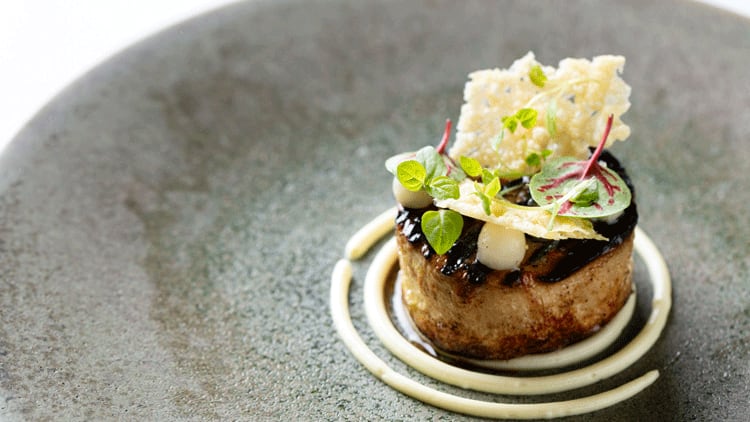
Murphy’s time at The Woodford was short lived with him staying less than a year despite the rave reviews his cooking garnered. It wasn’t without its troubles, and although he won’t be drawn on them, the increased pressures of having to turn tables and feed more people seems to have been a factor in his decision to depart (the restaurant went into administration a few months later).
From The Woodford came the move to Launceston when he was approached for the job via LinkedIn. Under the guidance of D&D he has blossomed not just as a chef but as a restaurateur, with D&D giving him the freedom to treat the restaurant as if it were his own, even down to letting him change the decor to his tastes.
“I’ve learned the finances and what it takes to run a restaurant correctly from D&D,” he says. “The Woodford had investment but there were loads of bodies involved and no direction or guidelines on where the money was going. I’m lucky, it feels like my restaurant. When [Des and David] come to eat they seem to be happy, they see the results and read the good reviews.”
At Launceston Murphy has also matured as a chef and a leader, putting the disciplines from D&D and those learnt under Koffmann into practice. The slightly shy, heavily tattooed chef of today has evolved his style of running a kitchen. “When I was at The Woodford, I was a bit of a dick and a lot of people said that,” he admits. “I wouldn’t say I took the team for granted but I was trying to have a structure of knowing the difference between right and wrong and not making any mistakes - whereas now it’s not about giving someone crap about messing something up. It’s more a case of just showing them again, even if it might take three of four times.”
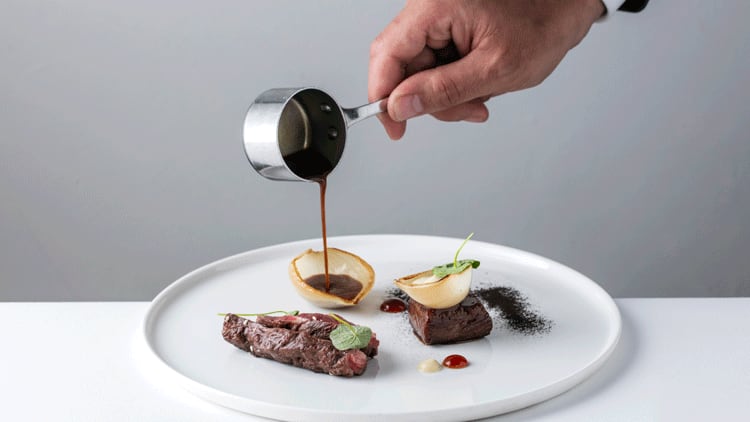
To this end, he recently employed a chef straight out of college with no professional kitchen experience but who approached him over social media and expressed a willingness to learn. “For me that’s important. I get really comfortable with the team I have around me, I know exactly how they work and what triggers them. I can tell if they’ve got issues at home and I know how to approach it, which as a head chef is important. You need to be that role model. Screaming at someone is not how you get the best out of someone.”
Reaching for the stars
For now, Murphy seems content. The chef-patron promotion and the status it brings as well as the new Phyllis menu will keep him at the Kensington restaurant for now but there is little doubt he will want to spread his wings at some point. When it was announced he was joining Launceston Place there was the obvious chatter of reclaiming the Michelin star that was won by Tim Allen but lost a few year later and this remains an objective (“the star would be quite a thing for us”).
“Michelin is the hobby of what I like doing, but I grew up on turkey dinosaurs and smiley faces. I don’t spend all my wages on going to Michelin star restaurants on my days off”
Yet he knows that even if this was achieved, and he believes he is certainly on the right track, it would unlikely lead to his name above the door - D&D’s Michelin-starred The Angler being a case in point - which is what he says he really wants.
“That would be ideal. If not, I’d like my own restaurant in the future. If I had the money to go it alone, I’d now know what to do in terms of running a restaurant, how to maintain staff, to work to a limit that I think is achievable thanks to D&D.”
More surprisingly is his admission that he would want more than one restaurant, and not in the fine dining model in which he has dedicated all of his professional cooking life.
“Would I like a chain of restaurants? Definitely. I like eating comfort food. I wouldn’t say I’m a foodie, I wouldn’t take my friends here (Launceston Place). Michelin is great, it is the hobby of what I like doing, but I grew up on turkey dinosaurs and smiley faces. I’m not that guy who spends all their wages on going to Michelin star restaurants on my days off - give me a good carbonara or a decent pizza any day.”
Now that would be a change for Great British Menu.


